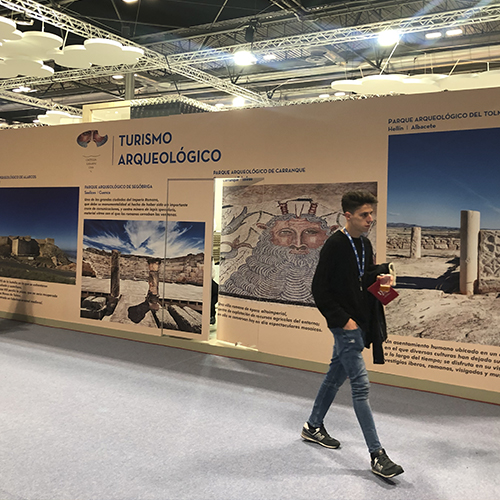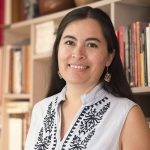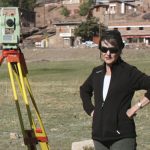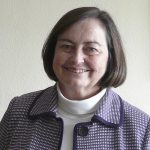
September 24th
10.30 – 14:00
That Archaeological Heritage exists in a complex and changing socioeconomic reality is not new. We have selected some of the challenges, which have been already addressed by professor Querol and her group, related to cultural heritage management: tourism (and obstacles and opportunities associated), archaeological looting (how it is understood by all different groups involved), citizen participation and conflict resolution (Archaeological heritage multivocality demands diverse strategies to address the many different perspectives that exist on it), the use of new technologies and economy (how we turn Archaeological heritage into a key aspect of sustainable development). We are looking for bold proposals to deal with these opportunities, proposals that are clearly for the future.
Speakers

Alicia Torija
Archeologist and professor at Tufts University MadridAlicia Torija is doctor by the Complutense University of Madrid after specializing in the fields of Ancient History and Prehistory . She has been a fellow of the CSIC, the University of Cambridge and the Newberry Library in Chicago. In the last twenty years, besides numerous publications of both informative and scientific nature, she has directed and participated in nearly a hundred archaeological interventions throughout Spain, as well as in other countries such as Egypt or Syria. She has coordinated teams at sites whose chronology spans the last ten thousand years.
She has also worked for two years on various projects of the National Archaeological Museum, as a cultural manager in the Sub-Directorate for the Protection of Historical Heritage of the Ministry of Culture and has been a UNESCO consultant for its World Heritage Center in Paris. In the last ten years she has been a professor of Cultural Heritage and Madrid’s History of Management in a consortium of universities in the United States. Currently, she is a professor at Tufts University and participates in the CSIC R + D + i project: “Resilience and Discontinuities in the Socio-ecosystems of Los Montes de Toledo (6000 Calbc-1850 Calad). Comparative Study of archaeological and Paleoenvironmental evidence”.
She is also secretary of AMTTA (Madrid Association of Workers in Archaeology) and vice-president of MCyP (Madrid Ciudadanía y Patrimonio [Madrid Citizens and Heritage]) from where she has carried out an intense social and civic work of dissemination and defense of cultural heritage (including its representation in the forum of Human Rights of the Madrid City Council and her work against the unconstitutionality of Law 3/2013). She is a founding member of the group of Feminist Archaeologists of the College of Doctors of Madrid; a proud member of the ARMH and member of the Regional Council of Historical Heritage of the Regional Government of Madrid.
She is the scientific coordinator and co-editor of various books: “Paisajes de la Guerra Civil y la Postguerra. Espacios amenazados [Landscapes of the Civil War and the Post-war period. Spaces threatened] ”(2017); “Mujeres en la guerra civil y la posguerra. Memoria y educación[Women in the civil war and the postwar period. Memory and education] ”(2019); “Tejiendo Pasado. Patrimonio Cultural y profesión, en género femenino[Weaving the Past. Cultural Heritage and profession, in the female gender]” (2019) and “Tejiendo pasado. Patrimonios Invisibles. Mujeres portadoras de memorias[Weaving the past. Invisible Heritage. Women carriers of memories]” to be published in 2020.

Belén Martínez
Deputy Director General for Development and Sustainability in the General Directorate of Tourism of the Regional Government of MadridBelén Martínez Díaz holds a degree in Archaeology from the Autonomous University of Madrid and is Curator of Museums of the General State Administration. She is Deputy Director General for Development and Sustainability in the General Directorate of Tourism of the Regional Government of Madrid since January 2013. She was Director General of Archives, Museums and Libraries of the Madrid City Council, from 2008 to 2012 and Responsible for Protection policies of the Archaeological Heritage of the Regional Government of Madrid, from 2002 to 2007.
She began her career at the Ministry of Education, Culture and Sport, holding various positions in State Museums, in the National Archaeological Museum and the Institute of Spanish Historical Heritage. Although her professional career has always been characterized by the protection and valuation of historical heritage, her work since 2013 has been focused on the creation of tourist products and the consolidation of destinations within the Regional Government of Madrid.
As an author, she has a hundred scientific publications and among them are particularly relevant, due to their impact, the monograph The Management of Archaeological Heritage in Spain (along with Maria Angeles Querol), published by Alianza Editorial, or her works on Preventive Archeology. It is also worth mentioning the edition of the Euro-Mediterranean Conference of those responsible for the Management of Underwater Archaeological Heritage of the European Commission, and her role in launching the journal of Museum and Notebooks of Maritime Archeology.

Elena Pérez
Associate Professor at the School of Social Sciences, Tourism Area, of the European University of the Canary IslandsElena Pérez is doctor of History, Territory and Culture: theoretical perspectives and research methodologies by the University of La Laguna. Her research has focused on cultural heritage management, particularly on archaeological heritage and tourism. She has been awarded with an Extraordinary Doctorate Award in the Field of Humanities.
She is Associate Professor at the School of Social Sciences, Tourism Area, of the European University of the Canary Islands (Tenerife, Canary Islands). She is the main researcher of the competitive research project entitled “Recovery of the archaeological landscape of Buenavista del Norte in rural and urban environments”, funded by the Fundación La Caixa and the Obra Social CajaCanarias. She is also part of the research team of the national project «Landscape and Society. Analysis of the social perception of the landscape through Virtual Ethnography (PAYSOC) led by the Andalusian Institute of Historical Heritage ”. She is member of the Spanish National Committee of the International Council of Monuments and Sites (ICOMOS-Spain) and the International Scientific Committee on Archaeological Heritage Management (ICAHM). She is member of the sectorial board of Cultural Heritage of the Los Llanos de Aridane City Council on the island of La Palma (Canary Islands). Her scientific production can be consulted at the following link: researchgate.net

Citlalli Reynoso
PhD in Anthropology (specialty in Archaeology)PhD in Anthropology (specialty in Archaeology) from the Institute of Anthropological Research of the National Autonomous University of Mexico. Master of Archaeology from the University of Calgary. Graduated in Anthropology with a specialty in Archeology from the Universidad Veracruzana. Candidate for the National System of Researchers of Mexico. She is a professor-researcher of the Postgraduate course on Socio-territorial Studies of the Institute of Social Sciences and Humanities “Alfonso Vélez Pliego” (Benemérita Universidad Autónoma de Puebla). She is specialized in topics such as urban archaeology of the city of Puebla, materiality, cuisine and archaeology, garbage and archaeology. Recently she has been working on socio-territorial processes and archaeology.

Luz Endere
Researcher of the National Council for Scientific and Technical Research (CONICET)Maria Luz Endere is a Lawyer (UBA, 1988), Archaeologist (UNICEN 1995), with a Masters degree in Museum and Heritage Studies (UCL, 1998), and a PhD in Archaeology (UCL, 2002). She is Main Category Researcher of the National Council for Scientific and Technical Research (CONICET); Full Professor of the chair of “Legislation and Management of Cultural Resources”, within the Degree of Archaeology (FACSO-UNICEN). She is teacher in the doctoral program of Archaeology, where she teaches the course “Cultural Heritage: theoretical and methodological aspects”. As Director of the PhD program in Archaeology she is part of the INCUAPA Institute (UE CONICET-UNICEN) directed by Dr. Gustavo Politis and within it she directs the Program of Interdisciplinary Studies of Patrimony (PATRIMONIA). She has numerous precedents in research, transfer, extension and training of human resources. Her topics of interest are: Legislation and management of cultural heritage, indigenous rights over cultural heritage; illicit traffic of cultural goods, Public Archaeology and studies about the cultural significance on heritage.

María Luisa Ruiz-Gálvez
Full Professor of Prehistory at the Department of Prehistory, Ancient History and Archeology of the UCMMaría Luisa Ruiz-Gálvez is Full Professor of Prehistory at the Department of Prehistory, Ancient History and Archeology of the Complutense University of Madrid (UCM). Her lines of research include the Protohistory of the Iberian Peninsula, of the Mediterranean, also the Prehistory of North Africa and Landscape Archaeology. She has made several research stays such as the Department of Archaeology of the University of Reading (UK) and at the Kommission für Archäologie Auβereuropïschr Kulturen, from the German Archaeological Institute. She is member of the research groups of the UCM “African Archaeology” and “Protohistory of Europe”. She has directed and participated in various competitive research projects, the most recent being those titled “Archaeology of Swahili trade in Northern Mozambique ”(PR47 / 17-20998) granted by the Ministry of Education, Culture and Sport or “Multicultural Trade in East Africa in Perspective of Long Duration (300-1800 A.D.). An archaeological approach ”(HAR2013-48495-C2-1-P) granted by the Ministry of Science and Innovation. She is a prolific writer of articles, chapters and research books such as “Landscapes of confrontation. Art, settlement and use of the environment in the Oukaïmeden Valley (High Atlas), Morocco ” (Ruiz-Galvez, M.L .; Señoran, J.M .; De Torres, J .; De la Presa, P. (2018); “The Atlantic Iberia: A Threshold Between East and West ”(2014). More information about her publications in:
academia.edu
researchgate.net

Nekbet Corpas
FPU fellow (Ministry of Education and Culture 2016) in the Department of Prehistory, Ancient History and Archaeology of the UCMNekbet Corpas is an archaeologist. She completed her undergraduate studies in Archaeology at the Complutense University of Madrid. She has completed two master degrees in Archaeological Heritage and Museums at the University of Cambridge and in Conflict Management and Resolution at the Complutense University of Madrid. She has been received with several grants for excellence awarded by the Regional Government of Madrid and scholarships from private foundations such as the Mutua Madrileña Foundation and the Banco Sabadell Foundation. She is currently a FPU fellow (Ministry of Education and Culture 2016) in the Department of Prehistory, Ancient History and Archaeology of the Complutense University of Madrid to develop her doctoral thesis on management of Archaeological Heritage and conflict.

Teresa Chapa
Full Professor of Prehistory at the UCMTeresa Chapa Brunet is Full Professor of Prehistory at the Complutense University of Madrid. She has been director of the Department of Prehistory (2002-6), coordinator of the master’s degree in archaeology (2006-7) and since 2013 is the Director of the Research Assistance Center (C.A.I) of the Complutense University of Madrid. Her main lines of research include Iberian sculpture, Iberian archaeology, use of technology for archaeological research, and funerary archaeology. She has participated and directed numerous research projects such as “Iberian Sculpture. Iconographic, technological and historiographic study ” awarded by the Ministry of Education and Science (Ref. HUM 2007-60074 // HIST) or “Space, economic practices and social models in Iberian times: the case of Alto Guadalquivir”, awarded by the Ministry of Science and Technology (Ref. BHA 2003-02881). She has published numerous articles and books, both popular and research, such as Chapa, T .; Vallés, J., 2015: “Georadar to preserve the archaeological heritage.” Red.escubre or Chapa, T .; Izquierdo, I. 2010: La Dama de Baza. A feminine trip to the afterlife. Ministry of Culture. Madrid.
Some of her publications are available at: researchgate.net